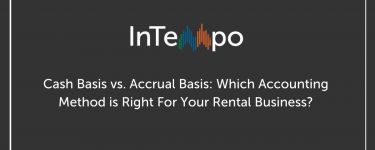How Does Accounting Work in a Rental ERP?
Rental ERP (enterprise resource planning) software gives you fully integrated tools to run your business. That means that accounting, operations, maintenance, and even dealership division sales are managed on the same platform.
While national chains have been using these software packages for years, smaller businesses are now discovering the advantages as well.
At InTempo, we've tailored our rental ERP to the needs of local and regional rental businesses. The robust functionality helps you level the playing field with the major players in the industry, but in a way that's more accessible for your growing business. (It also delivers more rental-specific accounting options than you'll find in other ERP packages, making your life easier as you manage your financials.)

One of the major advantages of an all-in-one rental ERP (as opposed to various point solutions) is that accounts receivable, accounts payable, and your general ledger are all unified. You don't have to leave one system and log in to a separate accounting package to create invoices, track your open payables, or close your books. All your data is in one place.
The fully integrated accounting package is the primary feature that differentiates ERP and non-ERP software. Non-ERP rental software lets you handle the operational side of your business (for instance, creating contracts and scheduling deliveries) but lacks a built-in accounting system. This means you'll need to integrate with a third-party accounting platform like QuickBooks. Unfortunately, this means that your data may only sync once or twice a day, which makes it more difficult to investigate real-time payment statuses or create to-the-minute reports. You may end up spending more time on phone calls or emails to track down past-due customer invoices, vendor agreements, or other financial documents.
A fully integrated ERP system, however, makes it easy to get a complete picture of your business at any given time. Let's take a quick look at the accounting features that can help you more easily manage your financials.
How Accounting Works in an ERP
Accounts Receivable (AP)
With receivables, cash receipts are posted in the same system used for billing, so you don’t have to look in different places to see when an invoice was paid. If you post a customer payment and that customer wants a copy of their statement, you don’t have to wait for another process to run to find out what they owe you, since balances are live. Your Accounts Receivable team can also:
- Automatically hit AR when an invoice is generated
- View complete customer history, including rental and payments histories and outstanding invoices
- Email electronic invoices and statements to customers as soon as they are generated
- Track credit history and average days to pay
- Track write-offs by invoices
- View AR aging for 30, 60, 90, and 120 days
- Set customer credit limits
As an example, with an ERP, if a customer wants to know what they have on rent and what their outstanding invoices are, that information can be supplied instantaneously — there’s no waiting for multiple systems to update.
Accounts Payable (AP)
In a true ERP, accounts payable is tied to purchase order receipts. You can see what POs have been received but for which AP has not yet been paid. In a single system, you can see what the check number was and when the check cleared for a specific PO. Your vendor order information and payment history is all in one place. Your Accounts Payable team can also:
- Automatically enter invoices
- Cut checks
- Run bank statement reconciliations
- Print checks and distribute cash
- Setup internal security
Because financials are automatically tied to the other tasks you complete in your rental software, all of your processes become faster. Here's what Hernan del Aguila, Owner of Partner Rentals, says about the approach:
“What makes ERP special is that these things are all a part of your rental system. When I write a purchase order and then receive it, and I run my accounts payable against it, being able to validate whether or not that purchase order has already been used or not, or whether it’s the same amount — these are things that are harder to do when your systems are separate.”
General Ledger (GL)
With an ERP system, as soon as a transaction occurs, it’s posted to the general ledger. There’s no waiting until the night or the end of the month for your data to refresh. You can drill down from the GL inquiry to look at the customer or vendor invoice that generated each transaction, one of the many benefits of having all of your data in one place. You can also:
- View the source invoice that created each accounting transaction in the journal
- View, print, and enter report data
- Match invoices to proper receipts
- Perform bank reconciliation
- Perform bulk journal entry uploads (e.g. payroll)
- Automatically manage accruals
Fixed Assets & Depreciation
Of course, it's also important for your accounting team to accurately track the depreciation of your rental assets over time. ERP software makes fixed asset management simple, letting you:
- Book depreciation using various methods
- Manage recapitalization of repairs through work orders
- Run purchase and disposal reports
- Track every asset value change
Fewer Delays, Instant Insights: How InTempo's Rental ERP is Making Accounting Easier for Partner Rentals
With all these features in one place, ERP software goes a long way in streamlining your accounting efforts. Here's more from Hernan:
“I don’t have time to wait once a night for my data to refresh. When I need to look at something, I need to look at it now. With an ERP system, I can have everything in one system, and have it available in real time. A non-ERP would have accounting in one system and operations in another. This can cause delays and make it harder to do reporting. As one example, when I write a purchase order and then receive the item, I run my accounts payable against it. The system validates whether or not the purchase order has already been used, whether it’s the same amount — things that would be difficult when your systems are separate. Another example is if you’re looking at a certain accounting transaction in the journal, you can toggle over to the source invoice that created it, and vice versa.”
See Our Rental ERP System's Accounts Payable, Accounts Receivable, GL, and Depreciation Features in Real Time
Want to see how our rental ERP can help you streamline your financials? Request a demo here. Or, check out another in-depth article: Ten Ways ERP Software Can Help You Streamline Accounting for Your Equipment Rental Business.


